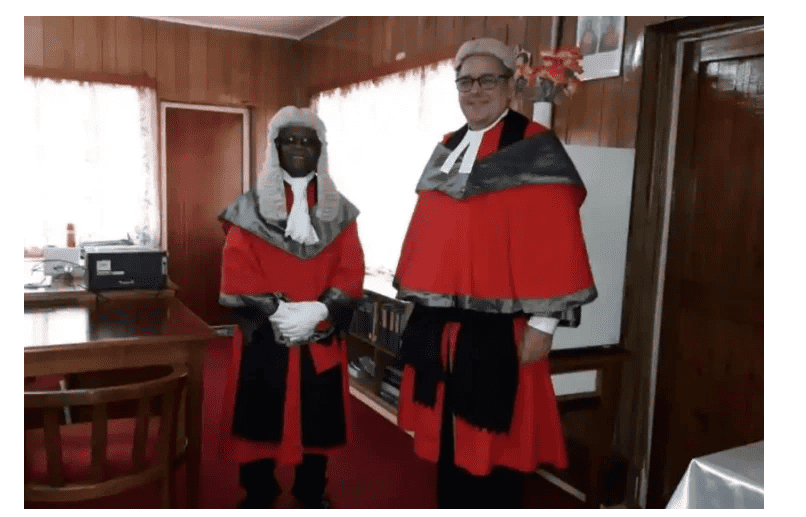An Australian judge is a step closer to being deported from Kiribati after the country’s parliament voted in favour of his removal from the High Court.
David Lambourne’s suspension from office two years ago on allegations of misconduct sparked a judicial crisis that has left the Pacific Island nation without any senior judges.
Justice Lambourne has fought a long-running legal battle to block his suspension but overnight the country’s parliament voted in favour of a resolution advising President Taneti Maamau to remove him from the High Court.
It’s effectively the penultimate step in the process to sack a judge and all that remains are for the president to sign an order authorising his removal.
Justice Lambourne has lived in Kiribati for many years and is married to the current opposition leader, Tessie Lambourne.
In a statement Justice Lambourne said he was deeply saddened by the resolution in parliament.
“This has been a process motivated not by a desire to do right by the constitution, but by politics, and the fabric of our democracy has been weakened as a result,” he said.
The vote in parliament followed the tabling of a report by a tribunal set up by the government to investigate the allegations of misconduct.
Of the five allegations against him, the tribunal found only one constituted a breach of the judicial code of conduct and that related to a delay in handing down a written judgement in a case.
In his statement Justice Lambourne said he was “denied natural justice from the beginning” and the tribunal’s procedures were “deeply flawed”.
“There has been a concerted attack on the independence of the judiciary in Kiribati by the president and the executive over the past two years,” he said.
The office of Kiribati President Taneti Maamau has not yet commented on Justice Lambourne’s deportation.
Kiribati has relied on expatriate judges for its senior courts but Kiribati’s government has dramatically escalated its campaign against the judiciary in recent years.
Legal groups in Australia — as well as a UN Special Rapporteur — have repeatedly criticised Kiribati’s actions, saying the government has made a series of moves to undermine judicial independence and interfere with judges’ security of tenure.
‘major setback for justice’ – UN
The vote by Kiribati’s Parliament to remove High Court judge David Lambourne is a major setback for justice and the rule of law, a United Nations expert says.
United Nations Special Rapporteur on the independence of judges and lawyers Margaret Satterthwaite was responding to a recommendation from a Kiribati tribunal that Kiribati High Court judge David Lambourne be removed.
“Judge Lambourne was removed after proceedings that violated international standards,” Satterthwaite said.
“He was not allowed to have a fair hearing, after almost four years of proceedings that have undermined the independence of the judiciary in Kiribati.”
In 2020, as Covid pandemic restrictions were imposed, Lambourne was in his native country, Australia, and his return to Kiribati was delayed. He was later denied entry to the country, despite having served as a High Court judge since his appointment in 2018.
He was reportedly told by the authorities that they would issue a work permit and allow him entry only if he signed a contract with an unprecedented and backdated three-year term, which would see his appointment end on 30 June 2021.
He was later able to enter Kiribati, but has since faced suspension and deportation efforts.
In May 2022, Kiribati President Taneti Maamau suspended Lambourne from the High Court and appointed a tribunal to investigate unspecified allegations of misconduct against him.
The following month, when the senior judge’s appeal against his suspension came up in court, the government suspended the chief justice who was to hear the case, before setting up the first of two tribunals to investigate Lambourne.
Satterthwaite said the second tribunal was marred by procedural irregularities and delays. It ruled that Lambourne should be removed, largely because some of his written judgements were not “promptly delivered”.
“I am very concerned at the unreasonableness of the tribunal’s conclusion that a conduct that could be remedied within the judicial procedure amounted to misbehaviour so serious that Judge Lambourne should be removed from office”, she said.
“I am appalled at the impact that this case has had on the independence of the judiciary in Kiribati.”
The Court of Appeal judgment in favour of Lambourne also led to a presidential decision to suspend the court’s three judges.
“The removal of judges without due process is a huge blow to judicial independence. The government must respect the independence of the judiciary,” Satterthwaite said.
“Under international standards, judges may be subject to suspension or removal only for reasons of proven incapacity or behaviour that renders them unfit to discharge their duties, and only in accordance with an appropriate procedure before an independent body.”
Kiribati needed to take all available measures to ensure the independence of the judiciary, she said
“Judge Lambourne has lived in Kiribati with his family for over 20 years. I urge the authorities to grant him a visa, which would allow him to remain in the country while he carries out his appeal,” she said.
Satterwaite had been in contact with the government of Kiribati regarding her concerns.
Judge Lambourne late on Friday night was visited by Kiribati’s Director of Immigration, who served him with a deportation liability notice.
It gives Lambourne 21 days to appeal, after which he will get a deportation order with immediate effect.
